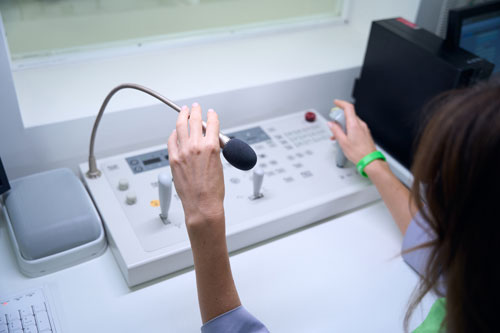HEARING TESTS & HEARING AIDS
HEARING TESTS &
HEARING AIDS
A HEARING TEST IS YOUR FIRST STEP TO BETTER HEARING

Getting a hearing test is crucial for maintaining overall health and well-being, as hearing plays a fundamental role in communication and social interaction. Regular hearing tests can help detect any potential hearing loss early on, allowing for timely intervention and management. Untreated hearing loss can lead to various negative consequences, including social isolation, depression, and decreased cognitive function. By undergoing hearing tests periodically, individuals can address any hearing issues promptly, improving their quality of life and maintaining their ability to engage fully in conversations and activities.
Furthermore, hearing tests are essential for identifying underlying medical conditions that may be contributing to hearing loss. Many systemic diseases and medical conditions, such as diabetes, cardiovascular disease, and autoimmune disorders, can impact hearing health. Detecting these conditions early through a comprehensive hearing evaluation can enable healthcare providers to implement appropriate treatment strategies and prevent further deterioration of hearing abilities. Ultimately, prioritizing regular hearing tests empowers individuals to take proactive steps towards preserving their auditory health and overall well-being, enhancing their ability to navigate the world around them effectively.
HOW DO WE TEST YOUR HEARING?
Hearing tests, also known as audiometric evaluations, are conducted by audiologists or trained healthcare professionals. These tests typically involve a series of procedures to assess different aspects of hearing function:
Pure Tone Audiometry: This test measures an individual’s hearing thresholds for different frequencies. The person wears headphones and hears tones at various frequencies and volumes. They indicate when they can hear the tones, which helps create an audiogram, a graph showing the softest sounds they can hear at each frequency.
Speech Audiometry: This assesses the individual’s ability to hear and understand speech. The patient listens to recorded speech at different volumes and repeats the words or sentences they hear.
Tympanometry: This test evaluates the function of the middle ear and the mobility of the eardrum by measuring its response to changes in air pressure. It helps identify conditions such as fluid in the middle ear or problems with the eardrum.
Otoacoustic Emissions (OAE) Testing: This test measures sounds produced by the inner ear in response to auditory stimuli. It is often used to screen for hearing loss, especially in infants and young children.
Auditory Brainstem Response (ABR) Testing: This measures the electrical activity in the auditory nerve and brainstem in response to sound stimuli. It is useful in diagnosing hearing loss, especially in newborns and individuals who cannot participate in conventional hearing tests.
These tests, combined with a thorough medical history and physical examination, help us diagnose the type and severity of hearing loss and develop appropriate treatment plans.
WE HAVE HEARING AIDS
TO SUIT ALL SITUATIONS
Discover the latest in hearing aid technology at Lindsay Ear Clinic, where advancements have brought about smaller, smarter, and more versatile devices. As an independently owned clinic, we take pride in offering a variety of brands, ensuring that we can find the perfect device tailored to YOUR individual needs. Our commitment to personalized care and cutting-edge solutions guarantees your satisfaction and an enhanced hearing experience. At Lindsay Ear Clinic, your unique needs are our priority.







